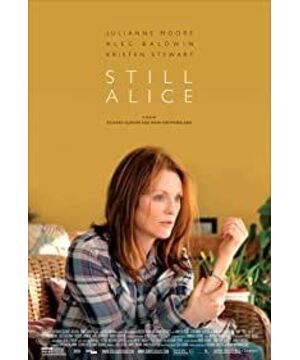Usually I don’t watch movies with this theme, no matter how positive and peaceful way it is shown, the cruelty of illness is always merciless, life is too fragile, and people who are helpless will always make people feel cold Desperate again.
The protagonist of the story, Alice, has a happy life compared to most people. She has a career she is proud of, a good educational background, a loving husband and three filial and excellent children. She was rational when she found out that she had memory loss, and even after the diagnosis, she tried to stay calm, without hysteria or self-abuse, she used various tools to train her memory, and recorded basic questions on her mobile phone every day. Answered, marked the speech to make sure he knew where he was talking, and even meticulously planned how to kill himself if one day he didn't get to answer any questions. But it is this kind of rationality that makes me feel so uncomfortable in those moments when I rarely vent. In the early morning when insomnia has not yet been diagnosed, he wakes up his sleeping husband to the point of crying with fear, collapses when he can't find the toilet in his home, and when he can't find the mobile phone he has been relying on in the middle of the night, his behavior is out of control. Alice cried out in pain, "I'd rather have cancer." At that moment, the Buddha had a hand on my throat, which made it hard to breathe. Yes, to Alice, cancer is a righteous disease, but AD is a shameful existence. It robs you of everything you used to be proud of, when the elegant self of the past became sluggish and demented, the smart self of the past became clumsy and inarticulate, and even those precious treasures in life - memories are there Gradually gone, and God is even more cruel, this Alzheimer's disease that Alice got is familial, and her children may suffer the same pain because of heredity, which is probably for a mother. The biggest torture. When she received a call from her eldest daughter Anna to inform her that she was diagnosed with AD, the helpless and sad back was extremely sad.
Alice tries to be calm and strong as she speaks and smiles that she is learning the art of losing every day, saying "I am not suffering. I am struggling, struggling to be a part of things, to stay connected to who I once was. "I can't imagine what kind of struggle it is, when the whole world you are familiar with is drifting away from you little by little, you don't remember where you are at home, you don't remember your former self, and even the closest people will disappear in the end. In your world, you have become an island, floating alone in an ocean without memory. What could be scarier than this?
When Alice accidentally clicked on the suicide tutorial video she had recorded for herself, it was probably the most heart-wrenching moment, but when she had deteriorated to the point where she couldn't remember everything that was said in the video half a minute ago, just over and over again When I was watching the video repeatedly, I was interrupted by a caregiver who came home suddenly and managed to escape suicide. Tears couldn’t help but flow. I was thinking about how it would be better to die with the last trace of dignity. , or live as a burden in the face of growing dementia.
What makes us who we are is our character, personality, education, knowledge, speech, background... it's all a combination of it. But when one day all of this goes away from ourselves, are we still ourselves? I was thinking about the title "Still Alice" repeatedly in front of the screen, which is obviously more metaphorical and far-reaching than the original title. At the end, Alice has almost lost her language function, but her daughter Lydia reads to her what is considered the most successful script in the United States in recent years, covering religion, sexual orientation, race, politics and many other elements from Tony Kushne's "Angels in" America" struggled but firmly answered her that it was a "Love" story.
Julianne Moore's performance alone set up the soul of the whole film, making such a film that was a little bland and messy in shooting and editing into a wonderful and moving film. She conveys such a successful woman's cautiously vulnerable and suppressed fears with truth and accuracy. After experiencing the polishing of age and world affairs, she seems to be more calm and calm, and to a greater extent, it forms a sharp and cruel contrast with Alice after her illness. He did not deliberately show the cruel and unbearable pain in the pain, nor did he deliberately and intensely provocative, but just frankly and unabashedly showed the cruelty of the disease. When I learned that Richard Glatzer, one of the screenwriters and directors of the film, also passed away from an equally terrifying and terminally ill ALS (commonly known as ALS), I thought the director chose to express such a story in such a calm way , It is probably that the director wants to convey everything about life and disease.
More precious than memory is the instinct of love.
2015.04.20
View more about Still Alice reviews











